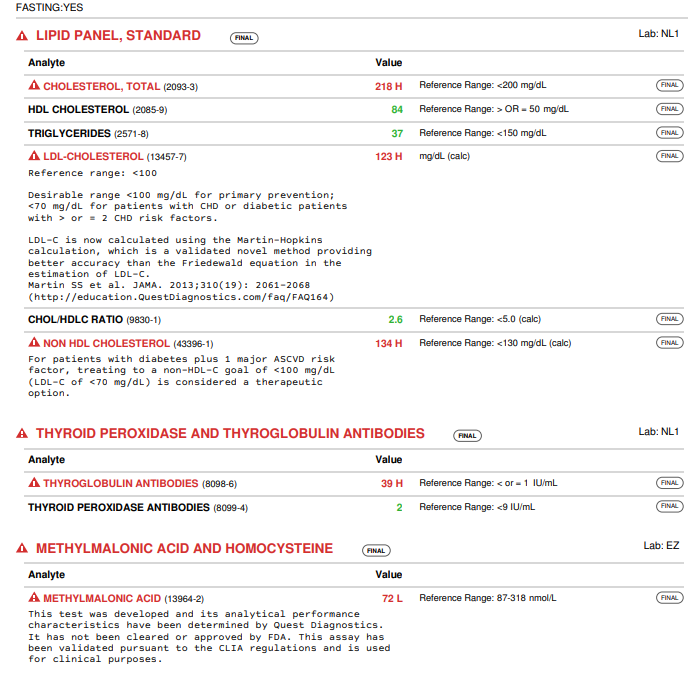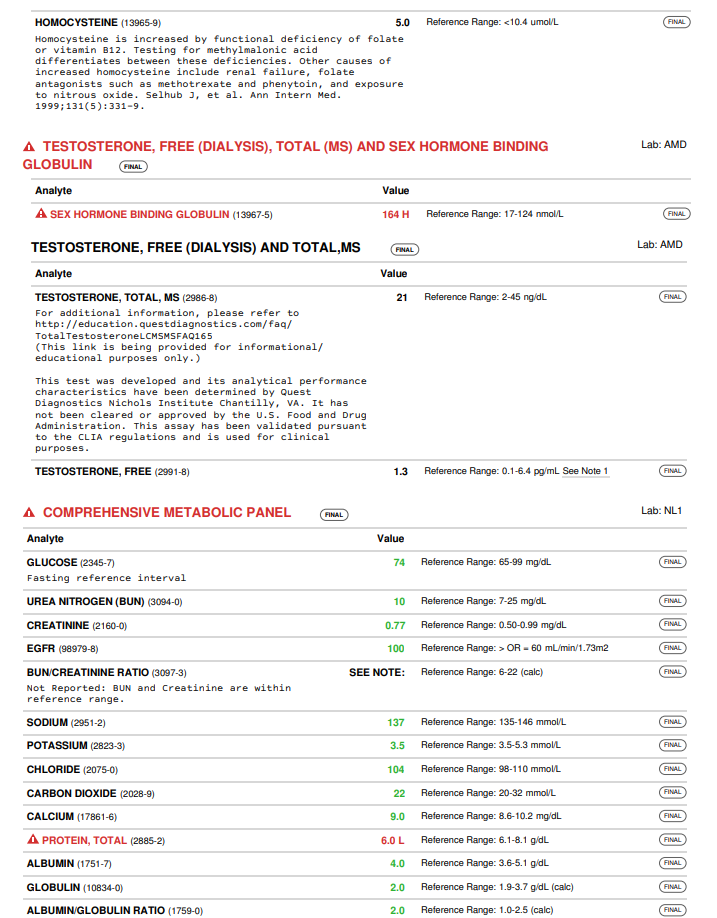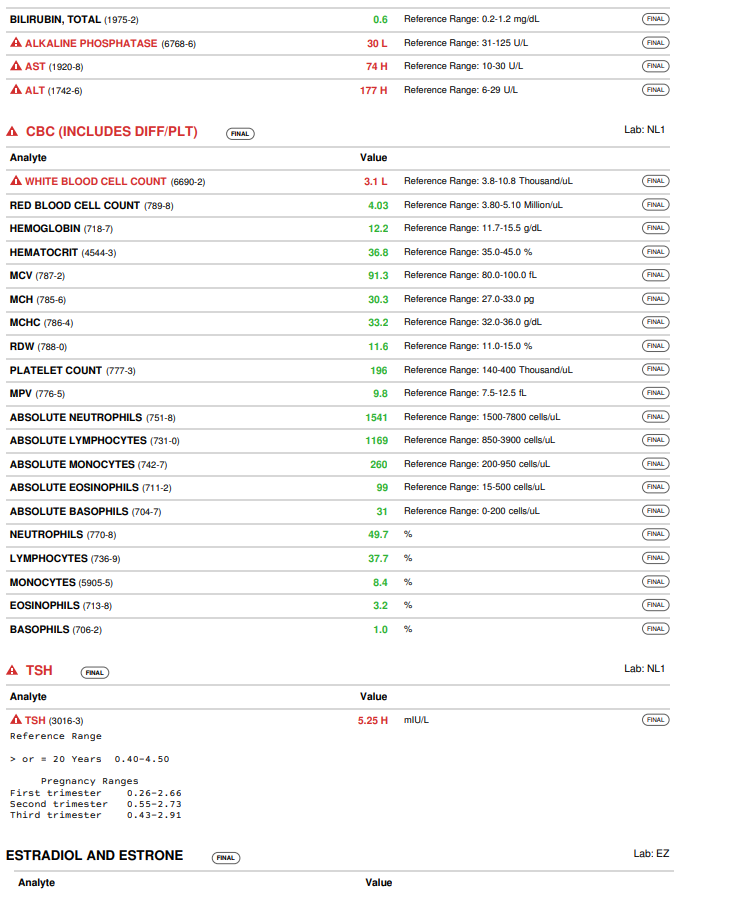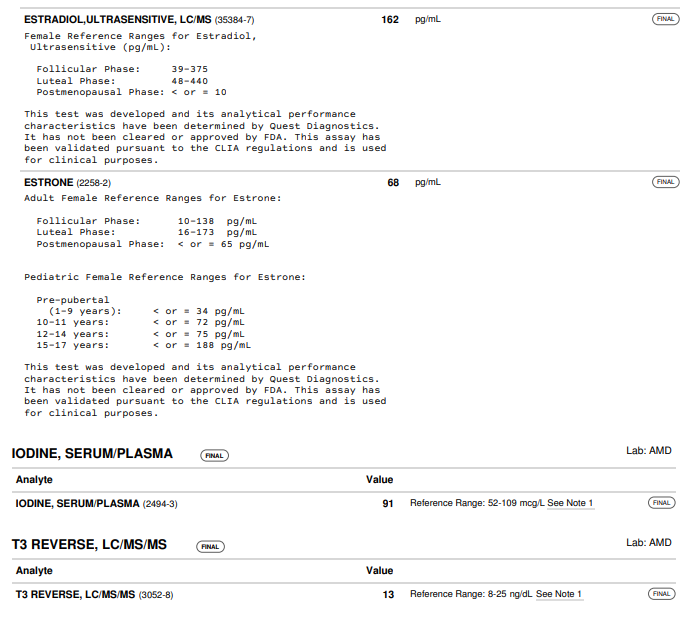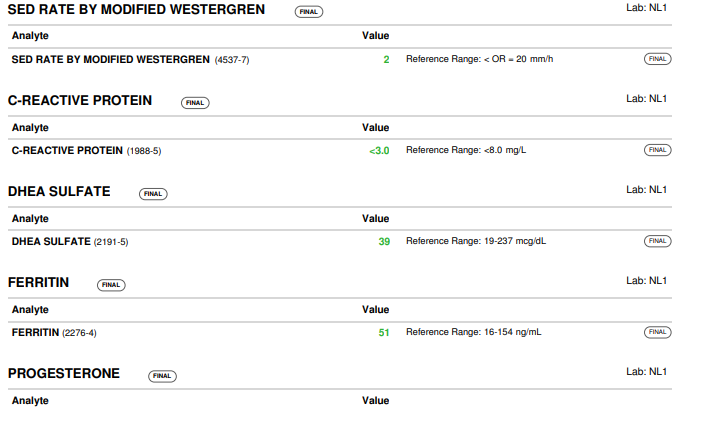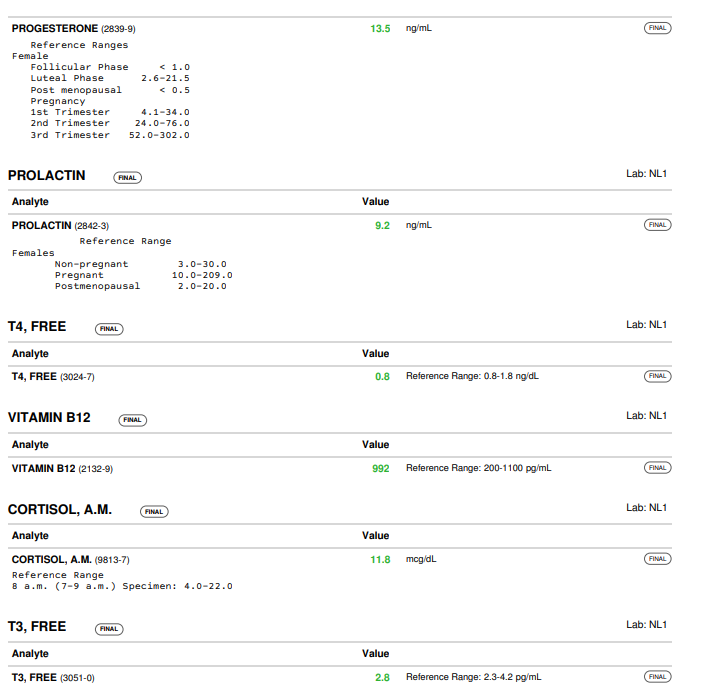Thyroid inflamation after months of supplementing
-
@T-3 can I please jump in and ask, why could even 2-3mcg of T3 per day induce severe hair shedding? Thank you.
(I've been applying Ray Peat's principles since 2014.) -
@Emilia I don't know. Based on what Peat wrote responding to people responding poorly to exogenous T3, I guess you've probably already given detailed consideration to the possibility of nutrient deficiencies, imbalanced ratios (copper : zinc, phosphorous : calcium, methionine : glycine, etc.) or high estrogen, prolactin, or Peaty approaches to treating PCOS (which may not be relevant at all, as I'm only guessing).
Based on my own experience, it's hard for me to imagine such negative symptoms in response to such a small does (2 or 3 micrograms of T3). But then again, I fully acknowledge that we're all different. Our beautiful heterogeneity (albeit sometimes frustrating in the context of not finding the benefits of a Peat experiment that others have posted about) should be kept front of mind. I'm mindful here to avoid overgeneralizations or one-size-fits-all pronouncements regarding how T3 can be used -- or may not be needed -- to achieve whatever we're individually after regarding whatever constitutes good metabolic health.
I can imagine how frustrating this is and don't mean to second-guess, but I have to ask:
--How confident are you that your hair loss is caused by 2mcg of T3?
--Have you tried NDT? If so, did it feel similar? Did it lead to similar problems?I'm with @Peatful in thinking that it's wise to stop anything that seems to be repeatedly causing negative symptoms. I wouldn't want you soldiering through without pausing and coming at it from a different angle.
On the other hand (at the risk of sounding like an uncritical promoter), I think it bears repeating that there's a lot of exaggerated fear-mongering by the medical establishment and in alt-health circles overstating (alleged) risks of T3 and NDT, while ignoring profound benefits (e.g., deliberately obscuring or discounting the work of Broda Barnes). The profoundly under-appreciated therapeutic potential for T3 notwithstanding, it seems it's not working well -- not a good match for your context -- at this time.
If you're willing to start a thread giving more detail about what you eat, what brought you to Peating, what health challenges led you to want to experiment with thyroid, how frequently you've experimented with the 2 or 3 mcg of T3, and more details about other things you may have noticed when experimenting with it, then this board would probably generate some further thoughts on what's going on.
The basics (which I'm guessing you've already thought about intensively after a decade of Peating) would be to introduce T3 when you're:
-- very well-fed overall (eating ample portions of whatever energy-dense foods you particularly enjoy);
-- getting plenty of salt;
-- eating good amounts of foods that provide the B vitamins and aminos that Peat talked about frequently;
-- consuming enough tropical fruits, ice cream, other sweets that would be generally protective against the paradoxical adrenalin/cortisol responses to T3 that Peat wrote about some people experiencing in the initial days or weeks when experimenting with thyroid meds.I hope that you'll achieve what you're wanting to achieve with exogenous thyroid, should you decide to revisit T3 or NDT -- or perhaps, better, finding a way to use food to achieve it.
-
@T-3 Thank you so much for your thoughtful and knowledgeable response.
In terms of my current dietary approach, I typically consume around 1,500 - 2,000 mg of calcium daily, mostly from raw or unhomogenised organic milk, and quality cheeses; milk powder pancakes, fruits, honey, medjool dates, 100% dark chocolate, coffee, gelatin, organic meats, seafood (recommended by Dr. Peat), and eggs. I would occasionally eat well-cooked greens or drink their cooked juices. I follow a starch free diet 99% of the time with occasional mashed potatoes or homemade nixtamalised tortillas.
I've experimented with cynomel and cynoplus on and off over the years, following advice from Dr. Ray Peat on dosage. While I initially saw positive results, I now face challenges even with small amounts of thyroid, despite a nutrient rich diet and adequate caloric intake.
My current supplements include Progest-E, magnesium, vitamin D and K2, colostrum powder, placenta, bee pollen, B complex, pine pollen, acerola cherry powder, and powdered oyster extract when fresh oysters are unavailable.
-
This post is deleted! -
Low cholesterol comes to mind as a possibility for thyroid intolerance.
How are your temps anyway? Maybe extra thyroid isn’t really needed for u
-
@BroJonas thank you for your response. My cholesterol levels aren't low. I often have cold hands though, classical symptoms..
-
@BroJonas I have some genetic markers for thyroid hormone resistance.
-
@Emilia Your diet sounds on-point, delicious and brilliantly pro-metabolic. I'm glad you mentioned about your cholesterol levels being adequate (for endogenous youth-steroid production), which is another important consideration when trying to rule out mechanisms that may lead to unwanted symptoms in general and to thyroid supplementation in particular.
Warm temperature in the hands and fingers, reaction speed (moderately quick "twitchiness" in the heel/hands/wrists) and absent brain fog (cognitive tone that wants to "see new possibilities", hungry for new insight, sensitive to aesthetics, e.g. 5-sense sensory pleasure of being outdoors, at least some fleeting moments of child-like "wonder", as Peat repeatedly mentioned) are among my most reliable "intuitive" indicators of good thyroid/metabolic status. Now I better understand your frustration: having on-point pro-metabolic diet for years on end and yet cold fingers as a persistent sign of (or consistent with) hypothyroidism or some metabolic block to achieving comfortably warm body temperature.
Just on a hunch: might you consider trying a quarter or half a grain of NDT?
I mostly prefer T3. But for whole-body warmth, there are times when NDT outperforms, especially in wintertime. I think NDT is more complex. I've had paradoxical responses to it after being on it regularly for multiple months, which brings me back to nibbling a T3 tablet as the simplest and most direct way for me to achieve the pro-metabolic markers I'm able to perceive. I use NDT sporadically every winter, usually for a spell of 3 or 5 days every few weeks if I don't get as much sunshine as I'd like, or am unusually busy with a work project that keeps me stuck in the office or sleep-deprived (e.g., international travel).
Please let us know if you figure anything out (with or without exogenous thyroid) that returns warmth to your hands and achieves the pro-metabolic markers you're wanting.
-
@T-3 thank you for your valuable time.
-
@T-3 said in Thyroid inflammation after months of supplementing:
This is important information to consider: that deiodinase 3, and not RT3, inactivates T3:
Well seen

Deiodinase and halogens
*) Watch out for fluorine, chlorine and bromine
Deiodination is essential to maintain TH homeostasis, and disruption can have detrimental effects. Halogen bonding (XB) to the selenium of the selenocysteine (Sec) residue in the Dio active site has been proposed to contribute to the mechanism for iodine exclusion.
Xenobiotics could also inhibit Dio activity by competitively binding to the active sites of thyroid.
Source:
A Halogen Bonding Perspective on Iodothyronine Deiodinase Activity
DOI: 10.3390/molecules25061328
*) Induced reasoning
If fluorine (toothpaste), chlorine (water) or bromine (nuts, seeds and fish, inorganic fruits):
If e.g. fluorine occupies the place of selenium on D3 (Deiodinase 3), the thyroid cannot function properly. This can lead to excess, with non -assimilated elements when taking a supplement with T3. rT3 will be too high at the final step. =>Deiodinases control local cellular and systemic thyroid hormone availability.
Reverse T3 (rT3) is a metabolically inactive form of thyroid hormone, which is generated from T4 via the type 3 5′-deiodinase enzyme.
Several other conditions also are known to lead to increased production of RT3, including stress, severe dieting, low serum iron levels, cortisol deficiency and diabetes.
*) Useful nutrients
Micronutrients as iodine, selenium, magnesium, iron, zinc, and vitamins B12, D3, and A.
DOI: 10.1097/MED.0000000000000831
Note: Before taking any iodine supplement, selenium has to be brought to, even in the case of Hashimoto suspected. -
Peat liked to see a minimum of 160ng/dl cholesterol before adding in extra thyroid in case anyone is wondering
-
@BroJonas only 160? Do you have a source for that? My wife has 164 and I thought it's too low; I recall reading that he considered 160 while already on thyroid acceptable.
-
@DonkeyDude said in Thyroid inflamation after months of supplementing:
only 160? Do you have a source for that?
Dr. Peat . . . . anywhere between 160 and 230, it's a healthy range
-
@DavidPS Thanks! Still, wouldn't it mean that 164 is a tad low for thyroid supplementation?
-
@DonkeyDude - 164 is within Dr. Peat's range, so it it not low. But it is not optium either. I queried Peatbot.com.
User: what is the optium level of cholesterol
Peatbot.com: The optimal level of cholesterol, particularly for longevity and maintaining mental function, appears to be around 270 milligrams per deciliter (mg/dL). This is based on studies of older women and observations from rest homes, where those with a cholesterol level of 270 mg/dL had the best longevity and functionality. Additionally, the Framingham study indicated that people over the age of 50 with cholesterol levels below 200 mg/dL were more likely to develop dementia.
-
@DavidPS but in the quoted statement he has also said that
But if your thyroid is a little more active, the cholesterol will probably go down to 200 or 190.
So if my wife started using thyroid, wouldn't her cholesterol dip below 160? Also, 270 as an optimum level sounds pretty insane and incongruent with the aforementioned quote.
-
@DonkeyDude - I agree. There appears to be a conflict in Dr. Peat's statements.
Here is a link to a YouTube video.
Ray Peat KMUD 12-19-08 Cholesterol is an Important Molecule Full Interview
-
@Sippy what are your liver enzyme numbers?
-
@DonkeyDude a little Pregnenolone will keep cholesterol from falling with thyroid supplementation.
-
@Ecstatic_Hamster Here are my labs:
